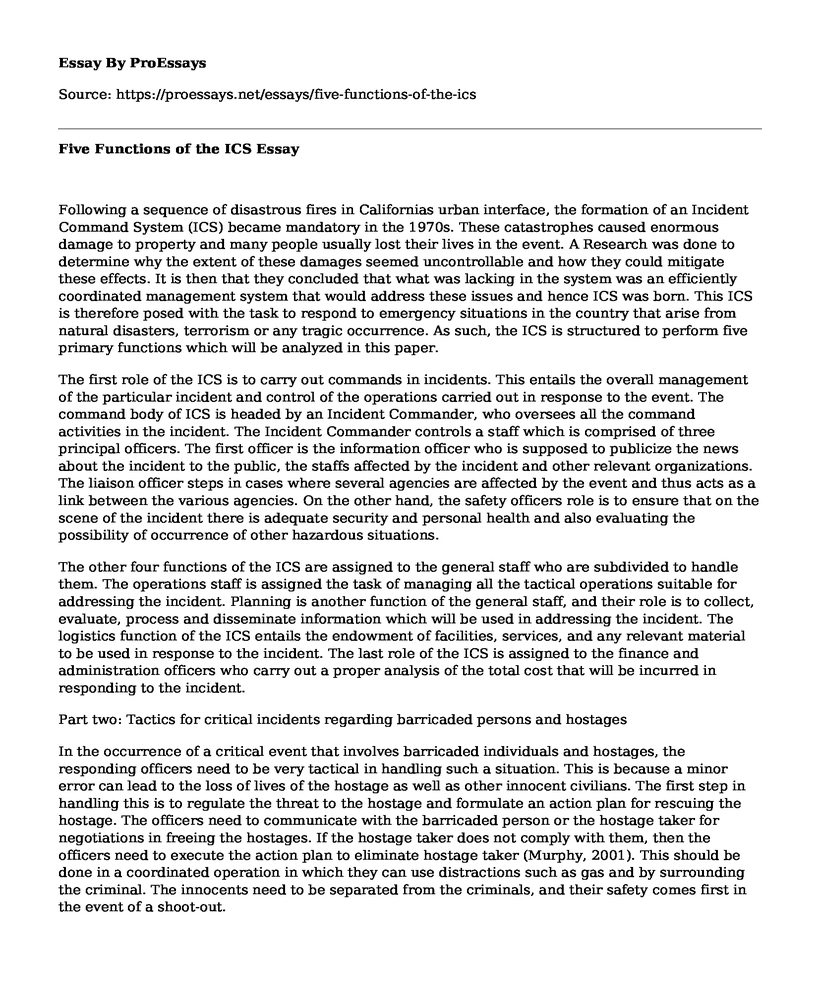Following a sequence of disastrous fires in Californias urban interface, the formation of an Incident Command System (ICS) became mandatory in the 1970s. These catastrophes caused enormous damage to property and many people usually lost their lives in the event. A Research was done to determine why the extent of these damages seemed uncontrollable and how they could mitigate these effects. It is then that they concluded that what was lacking in the system was an efficiently coordinated management system that would address these issues and hence ICS was born. This ICS is therefore posed with the task to respond to emergency situations in the country that arise from natural disasters, terrorism or any tragic occurrence. As such, the ICS is structured to perform five primary functions which will be analyzed in this paper.
The first role of the ICS is to carry out commands in incidents. This entails the overall management of the particular incident and control of the operations carried out in response to the event. The command body of ICS is headed by an Incident Commander, who oversees all the command activities in the incident. The Incident Commander controls a staff which is comprised of three principal officers. The first officer is the information officer who is supposed to publicize the news about the incident to the public, the staffs affected by the incident and other relevant organizations. The liaison officer steps in cases where several agencies are affected by the event and thus acts as a link between the various agencies. On the other hand, the safety officers role is to ensure that on the scene of the incident there is adequate security and personal health and also evaluating the possibility of occurrence of other hazardous situations.
The other four functions of the ICS are assigned to the general staff who are subdivided to handle them. The operations staff is assigned the task of managing all the tactical operations suitable for addressing the incident. Planning is another function of the general staff, and their role is to collect, evaluate, process and disseminate information which will be used in addressing the incident. The logistics function of the ICS entails the endowment of facilities, services, and any relevant material to be used in response to the incident. The last role of the ICS is assigned to the finance and administration officers who carry out a proper analysis of the total cost that will be incurred in responding to the incident.
Part two: Tactics for critical incidents regarding barricaded persons and hostages
In the occurrence of a critical event that involves barricaded individuals and hostages, the responding officers need to be very tactical in handling such a situation. This is because a minor error can lead to the loss of lives of the hostage as well as other innocent civilians. The first step in handling this is to regulate the threat to the hostage and formulate an action plan for rescuing the hostage. The officers need to communicate with the barricaded person or the hostage taker for negotiations in freeing the hostages. If the hostage taker does not comply with them, then the officers need to execute the action plan to eliminate hostage taker (Murphy, 2001). This should be done in a coordinated operation in which they can use distractions such as gas and by surrounding the criminal. The innocents need to be separated from the criminals, and their safety comes first in the event of a shoot-out.
References
Incident Command System/ Unified Command (ICS/UC): The National Response Team; Technical Assistance Document. Retrieved from:www.au.af.mil/au/awc/awcgate/nrt/ics_uc_ta.pdf
Ken Buscho, Cal-ESAR, 1996. ICS Position Descriptions. Retrieved April 12, 2010, from: http://www.cal-esar.org/operations/ics-positions.Murphy, Richard A. (2001), "Hostage and Barricade Incidents: A Profiling Perspective" Theses and Dissertations. Paper 48.
Cite this page
Five Functions of the ICS. (2021, Mar 11). Retrieved from https://proessays.net/essays/five-functions-of-the-ics
If you are the original author of this essay and no longer wish to have it published on the ProEssays website, please click below to request its removal:
- Cause of Police Reforms in Mexico
- Research Paper on Racial Profiling by Police
- Research Paper on Police Diversity in the Post-Ferguson Era: Its Impact on Crime Rates
- Essay on Ordinary Men: Reserve Police Battalion 101 and Nazi Genocide in Poland
- Revolutionizing Transportation: Cars Since the Advent of Karl Benz - Research Proposal
- Essay Example on Exploring Positive Youth Justice: Assessing Claims of Uniqueness and Robustness
- Essay on Police Searches & Seizures: The Balance Between Civil Liberties & Society







